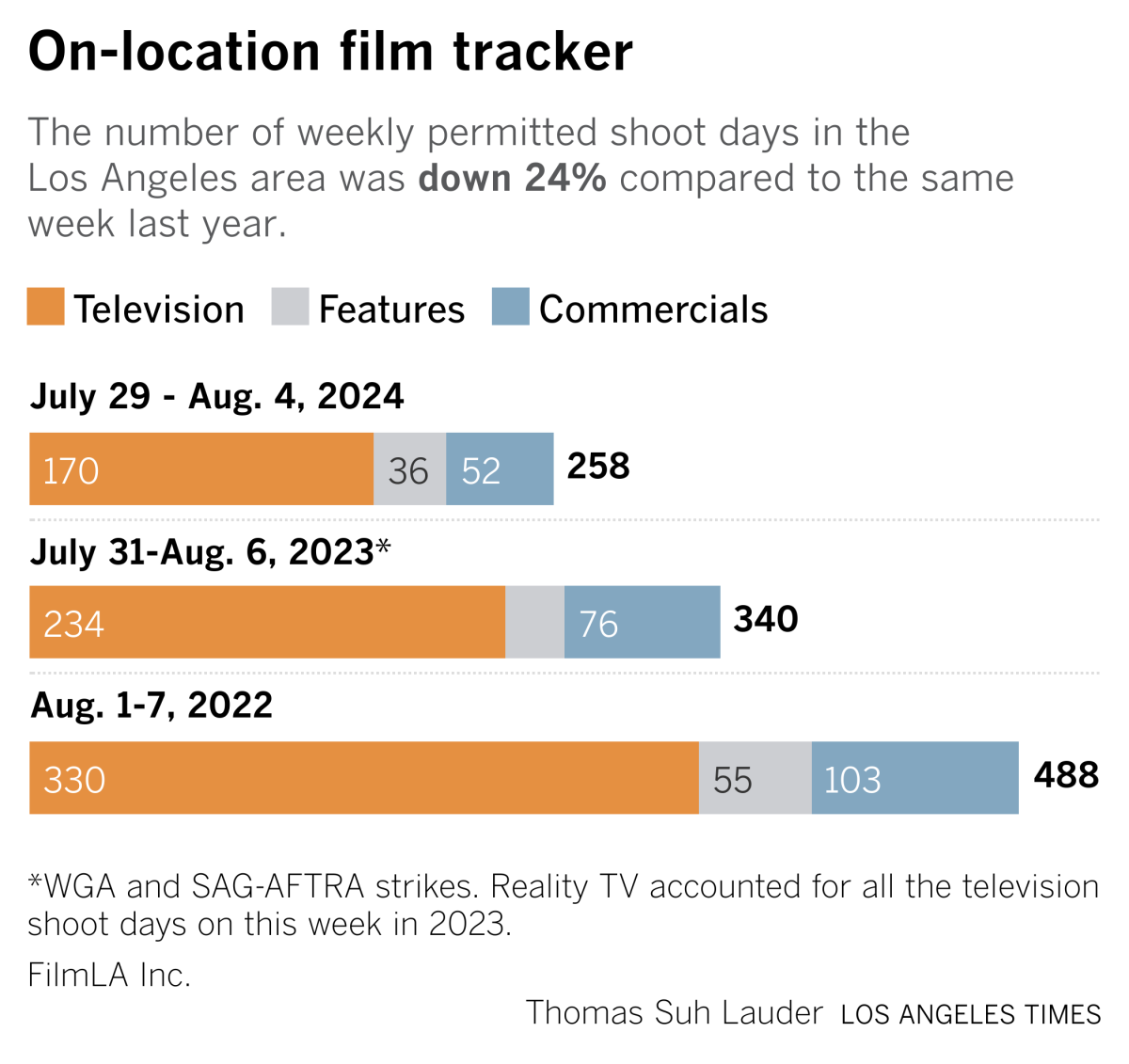‘Dexter’ won’t die. How Showtime used Netflix to hype its expanding serial killer universe

- Share via
Showtime can’t let “Dexter” die — the franchise and, it turns out, the eponymous antihero himself.
Fans were unhappy with the ending of the original series in 2013, which remains the most watched program in the history of the Paramount-owned premium cable network. They were perhaps even angrier about how the recent revival, “Dexter: New Blood,” concluded in 2022, with Dexter Morgan’s son, Harrison, murdering him.
Loyal followers were having none of it. They didn’t buy the ending, believing it betrayed the character of the brilliant serial killer with a code played by Michael C. Hall.
But Paramount Global co-Chief Executive and Showtime boss Chris McCarthy saw an opportunity to harness viewers’ enthusiasm, even if their emotions were negative. This was a group of people who cared enough about the show to go into painstaking detail online about how the finale didn’t work and how the show should have ended. Those are the makings of a potentially lucrative multipronged franchise.
“To fall in love with a serial killer, frankly, takes a minute,” McCarthy, president and CEO of Showtime/MTV Entertainment Studios and Paramount Media Networks, said in an interview. “I knew that there would be a really big opportunity if we could crack the nut of what is the love and passion of the series but then actually explode it into a franchise.”
So Paramount is taking a gamble. It’s branching out one of Showtime’s most beloved properties, much in the same way that the company turned Taylor Sheridan’s “Yellowstone” into a western cable TV and streaming universe with spinoffs and prequels. The first show in this effort is “Dexter: Original Sin,” which launches on Paramount+ with Showtime in December.
Set in the 1990s, the origin story features several actors who became famous during that era of movies and TV, including Christian Slater and Sarah Michelle Gellar. At Comic-Con San Diego last month, the company announced that Hall would return to star in the new series, “Dexter: Resurrection,” effectively bringing the character back from the dead, and to do voice-over work for “Original Sin,” a prequel in which Patrick Gibson plays a younger Dexter.
Clyde Phillips, the original showrunner on “Dexter” and “New Blood,” happened to have seen every episode of “Yellowstone” and its Paramount+ prequels, “1883” and “1923,” so he understood what McCarthy was looking for when they started talking about where to go with the property.
“This will appeal to a new audience, who will then go back and watch the original show,” Phillips said of the strategy. “That’s the wisdom here. Rather than just continuing with the show, we’re giving them a prequel, and they can watch and say, ‘Hmm, this is interesting. I wonder what the old show is.’ ”
The broader idea is to use “Dexter” and new Showtime series, including “The Agency” starring Michael Fassbender, to bring a bigger audience to streaming service Paramount+, which is growing but still lags rivals including Netflix and Disney+. The service reached 71 million subscribers after adding 3.7 million during the most recent quarter. It accounted for just 1.1% of U.S. TV viewing in June, according to Nielsen.
Boosting Paramount’s streaming prowess is a high priority for a company that is in the midst of a tumultuous period of change. Paramount and David Ellison’s Skydance Media are set to merge next year, after finally getting the sign-off for the complicated deal from Paramount’s board and its controlling shareholder, Shari Redstone.
Showtime has already undergone its own massive overhaul. After years of being a respected but distant No. 2 to HBO in the premium pay-TV business, the Showtime brand was merged with Paramount+, essentially ending its run as a standalone force in cable and streaming.
But Paramount’s theory is that Showtime and its shows still have appeal among a more affluent and city-dwelling audience than many of the channels, such as CBS, that feed the company’s larger streaming effort, which is powered by content such as “Mayor of Kingstown,” “Star Trek” and “NCIS.”
To further stoke momentum for the “Dexter” expansion, Paramount turned to Netflix.
Fans of “Dexter” tend to be in an age range of 40 to 60 years old, so Paramount needed a way to get the series in front of younger viewers. To do that, the company took the usual step of making a one-year licensing deal for Netflix to stream the original eight seasons on its service. Execs were hoping for a version of the “Netflix effect” that made basic-cable stalwart “Suits” a streaming hit years after its run on USA Network.
After all, Netflix had already seen major success with serial killer-themed shows such as “You,” “Dahmer” and “Mindhunter.” So Paramount ended up turning to an ostensible rival in order to, in McCarthy’s words, create “a conduit for brand-new fans.” The Netflix license expires next summer, around the time when “Resurrection” is scheduled to debut.
The show landed on Netflix in mid-June with 96 episodes and quickly rose into the top-10 charts for U.S. streaming across all services, according to Nielsen data. During the week of July 1-7 (the most recent data available), “Dexter” amassed 1.2 billion minutes viewed, making it the sixth most-watched program on streaming during that time period.
Premiering in 2006, Dexter eventually grew to 3.6 million linear viewers for its series finale, nearly five times the audience of its debut, making it the No. 3 premium cable show at the time, behind HBO’s “Game of Thrones” and “True Blood.”
By the time “Dexter: New Blood” arrived in 2021, the world of cable had changed dramatically, with pay-TV bundles on the decline and streaming on the rise. The premiere drew 1.2 million viewers to Showtime, but its audience increased to 3.9 million through streaming and video on-demand. It was easily the top driver of signups for Showtime’s now-defunct standalone streaming offering.
Today, the television landscape has shifted even more, and it remains to be seen whether the fan base for “Dexter” can support multiple continuations and offshoots after all this time. But McCarthy is optimistic that old fans and new ones will come back to Paramount+ for more.
“We can create a universe as big as we want, but there is still a really large younger audience that is not in our service today but could potentially be,” McCarthy said. “Those were the elements that we pulled together to make what I think is going to be a monster hit for us.”
The other big question remains: Will audiences buy Hall’s return to the role of Dexter Morgan, after he was so controversially killed off?
“Who are we kidding?” Phillips said. “If we get Michael C. Hall back into Showtime’s No. 1 show on Paramount+, people are gonna watch it. So we’re invigorated in the writing room, now that we’ve figured out how to bring him back.”
You’re reading the Wide Shot
Ryan Faughnder delivers the latest news, analysis and insights on everything from streaming wars to production — and what it all means for the future.
You may occasionally receive promotional content from the Los Angeles Times.
Stuff we wrote
Why Amazon Prime’s hit anti-superhero series ‘The Boys’ keeps getting bigger. The ‘supes’ and ‘The Boys’ are finding new fans. The current batch of eight episodes is the second most-watched season of a TV series in Prime Video’s history.
Striking video game actors hit picket lines over AI: ‘The human element is irreplaceable.’ SAG-AFTRA video game actors picketed outside Warner Bros., home of a major gaming studio, in Burbank while striking over artificial intelligence.
John Dickerson and Maurice DuBois named anchors of ‘CBS Evening News’ in major overhaul. Dickerson and DuBois will anchor the broadcast, which is moving from Washington to New York, after Norah O’Donnell leaves following the election.
The Hollywood production collapse’s latest victim: Why the reality TV bubble finally burst. Reality TV production levels are way down compared with last year. Workers and industry experts are weighing in on the decline.
Google loses major antitrust case over search, declared a monopoly by judge. In a major blow to Google, a federal judge on Monday ruled that the tech giant maintained and abused a monopoly on web searches.
ICYMI:
‘Deadpool & Wolverine’ trounces ‘Trap’
DOJ says TikTok broke child privacy laws
Lemon sues Musk
Disney lays off 140 in TV
Number of the week

Sure, Venu Sports, the upcoming joint streaming venture from Disney, Warner Bros. Discovery and Fox, will cost less than a cable TV subscription.
But at $42.99 a month, it still won’t have all the sports that big-time fans would want, since it lacks the participation of CBS and NBCUniversal.
The theoretical target audience is people who care about sports and don’t currently pay for a traditional TV bundle.
How many people actually want a service like Venu at that price point, when its customers will still miss out on many major events, including a good chunk of NFL and NBA games?
We’ll find out when the service launches in the fall, but the appeal seems limited.
Google flubs an AI ad
Silicon Valley is showing us that it’s really hard to market its apocalyptic sci-fi technology.
Google stepped in it during the Summer Olympics with its now-infamous “Dear Sydney” ad, in which a father uses the company’s Gemini AI tool to help his daughter compose a letter to American track and field star Sydney McLaughlin-Levrone. The backlash was swift and fierce.
It turns out, the idea of using artificial intelligence for what’s supposed to be a personal and loving act of parenting creeps people out. Google on Friday said it would pull the ad.
This is just the latest example of a tech ad that blew up in a company’s face. Earlier this year, Apple pulled its commercial that depicted a slew of beloved objects — musical instruments, tubes of paint, a sculpture, a record player — getting literally smashed and flattened by a machine to create the new iPad Pro.
Film shoots
Another “ouch” production chart for the L.A. area.

Best of the web
— Eric Deggans’ five takeaways from Trump’s appearance in front of a Black journalists organization. (NPR)
— How ‘Deadpool & Wolverine’ danced around China’s censors with its f-bombs and cocaine references. (WSJ)
— ‘Pod Save America’ company Crooked Media faces the wrath of disillusioned employees. (Bloomberg)
— USC Annenberg study finds a representation regression in Hollywood. (LAT)
Finally ...
I don’t usually do news in this section, but this is worth an exception. Wall Street reporter Evan Gershkovich is finally free after 16 months of imprisonment in Russia. One of his final acts before leaving: requesting an interview with Putin.
The Wide Shot is going to Sundance!
We’re sending daily dispatches from Park City throughout the festival’s first weekend. Sign up here for all things Sundance, plus a regular diet of news, analysis and insights on the business of Hollywood, from streaming wars to production.
You may occasionally receive promotional content from the Los Angeles Times.




